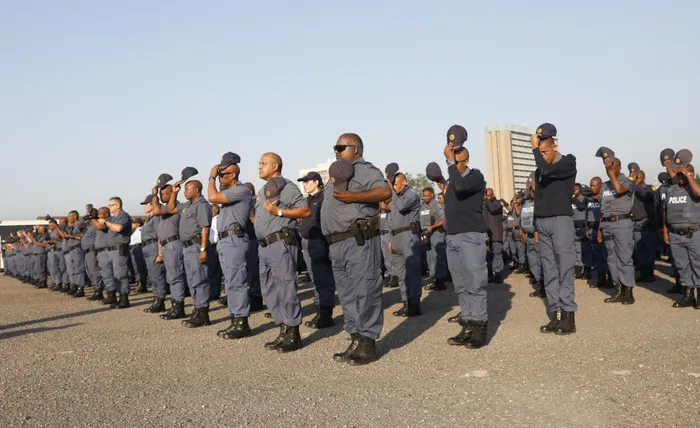
Trust in the South African Police Service has reached a historic low according to a recent study.
Image: Doctor Ngcobo / Independent Newspapers
Public confidence in the South African Police Service (SAPS) has plummeted to a record low, according to new findings by the Human Sciences Research Council (HSRC), sparking renewed calls for urgent structural reforms, depoliticisation of senior appointments, and stronger accountability mechanisms.
Released as part of the HSRC’s 21st round of the South African Social Attitudes Survey (SASAS), the data reveals that only 22% of South Africans expressed trust in the police in 2022, with confidence levels in 2023 and 2024/25 remaining virtually unchanged. These are the lowest figures recorded in 27 years.
The study shows that public trust in SAPS has been on a steady decline since the late 1990s, with significant drops following incidents like the Marikana massacre in 2012 and the July 2021 social unrest. Despite a slight rebound around 2015, confidence never returned to previous levels and has continued to deteriorate.
Recent allegations made by KwaZulu-Natal police commissioner Lieutenant-General Nhlanhla Mkhwanazi against a senior national commissioner for crime detection and Police Minister Senzo Mchunu have also dented the public's trust in the police service.
“The public simply does not feel like the police will show up when they call,” said Ian Cameron, chairperson of the Portfolio Committee on Police.
“Many people see the police as just being an insurance reference provider and that they need to open cases for insurance purposes. That has become the general feeling amongst people when you say, ‘call the police.’ They’d rather call a neighbourhood watch or even private security if they can afford it.”
Cameron added that corruption and lack of consequences were at the heart of the problem. “Lack of integrity management is a major crisis. The arrests and charges and infighting within the South African Police Service over the last few years has just made it far, far worse than before.”
The HSRC’s principal investigator Dr Benjamin Roberts noted that the survey tracks trust levels over a 27-year period and highlights persistent legitimacy concerns. “A majority of the adult public never expressed trust in the police, suggesting that police legitimacy has been a longstanding issue,” the report stated.
Chad Thomas, organised crime expert and CEO of IRS Forensic Investigations, said the deterioration of trust has its roots in leadership failures. “There has been a deficit of top leadership for 25 years since Jackie Selebi was first appointed as commissioner of SAPS. This was a clear political appointment, as was the appointment of Bheki Cele and Riah Phiyega. None of the three had any policing experience.”
He said even the appointment of career police officers in recent years has failed to restore trust, due to corruption allegations. “Twenty-five years of ineffective and controversial leadership has resulted in the SAPS relationship with the citizenry of this land declining to a point where the trust relationship is basically broken.”
Thomas believes restoring trust will require far-reaching changes. “Politics and the police do not mix well. Appointments of senior leadership must be done via a clear and transparent process involving Parliament and civil society. Appointees must be experienced, clear of any controversy, meet the requirements of a lifestyle audit and thorough security clearance.”
He further warned that without accountability, trust will remain elusive. “Trust will be restored when we see accountability and consequences for the actions taken by bad actors within SAPS. The President should also consider appointing an Inspecting Judge of Police Services, much the same as the appointment of retired constitutional judge, Justice Cameron, who has been very effective within correctional services.”
On the impact of major incidents like Marikana, the July 2021 unrest, and high-profile abuse of power cases, Thomas said: “There will always be incidents that will lead to criticism of the police. It is their overall conduct that counts.”
He controversially pointed to El Salvador’s “Bukele Model” as a policing system South Africa might study. “The focus of this model is a tough stance on dismantling organised crime gangs and has led to a significant decrease in murder and other crimes. The problem is that criminals have too many rights in South Africa and we don’t have space to house all the hardened criminals. I would suggest a state of emergency against crime and the conversion of army bases and unused stadia into prison camps.”
David Bruce, a policing and criminal justice expert with the Institute for Security Studies, said the HSRC survey raises important questions. “There are questions about the main causes of declines in trust and whether these are about poor public experiences of service delivery or related to disrespectful treatment by police or problems like corruption. Major public controversies such as the brutality by the VIP protection unit or the recent allegations about high-level corruption in the SAPS obviously don’t help much either.”
Bruce called for a re-evaluation of the country’s entire policing model. “There needs to be a programme of strategic strengthening of the SAPS, and it is to be hoped that the new Minister tries to carry forward work that has been done on this. However, this needs to be linked more clearly to re-evaluating the model of policing that has been implemented in South Africa.”
“South Africa’s policing system is colonial in origin and needs to be grounded more fully in the reality that South Africa is a developing country that is characterised by enormous inequality,” Bruce said.
Related Topics: